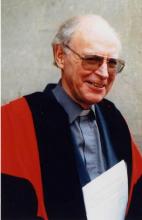Dr. Arthur Peacocke was born in 1924 in Watford near London. After gaining a PhD in physical biochemistry from the University of Oxford in 1948 he became a lecturer in chemistry and then senior lecturer in biophysical chemistry at the University of Birmingham. From 1959 until 1973 he worked as a fellow and tutor at St Peter’s College in Oxford.
Specializing in biological macromolecules, Peacocke pioneered early research into the structure of DNA. Although a self-described ‘mild agnostic’ in his earlier years Peacocke began to search for answers he was not able to find in natural science alone. He began to study theology with the encouragement of Professor Geoffrey Lampe, and in 1960 received both a diploma in theology and a BDiv from Birmingham University in 1973.
Taking interest in the relation between his scientific and theological pursuits, he published Science and the Christian Experiment in 1971, a book for which he was awarded the prestigious Lecomte du Noüy Prize. In the same year he was ordained as a priest in the Church of England and served on its Doctrine Commission. In 1973 Peacocke became Dean of Clare College, Cambridge, a position he held for eleven years and which allowed him to teach both biochemistry and theology.
Peacocke gave the Bampton Lectures in 1978 in Oxford published as Creation and the World of Science. Seven years later he became founding director of the Ian Ramsey Centre for the Interdisciplinary Study of Religious Beliefs in Relation to the Sciences including Medicine at St. Cross College, Oxford, a position he held until 1988. In addition, he founded the Society of Ordained Scientists, the UK Science and Religion Forum and the European Society for the Study of Science and Theology. From 1989 until 1996, Peacocke was honorary chaplain of Christ Church Cathedral, Oxford, and was then made an honorary canon. He was made a member of the Order of the British Empire by Queen Elizabeth II in 1993.
He lectured on science and theology in the United States on various occasions and held visiting professorships at the Chicago Centre for Theology and the Natural Sciences at Berkeley and at Tulano and Georgetown universities as well as in other parts of the world especially in Japan.
His theological and philosophical publications consist of sixty-three articles and nine books and he published widely in biochemistry. Peacocke was the winner of the 2001 Templeton Prize for Progress in Religion considered to be the religious equivalent to the Nobel Prize.
His theological books include Science and the Christian Experiment (1971); Creation and the World of Science (1979); Intimations of Reality: Critical Realism in Science and Religion (1984); Theology for a Scientific Age: Being and Becoming: Natural Human and Divine (1993); God and the New Biology (1994; first published 1986); From DNA to DEAN: Reflections and Explorations of a Priest-Scientist (1996); God and Science: A Quest for Christian Credibility (1996); and Paths from Science Towards God: The End of All Our Exploring (2001).



